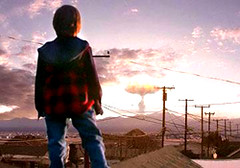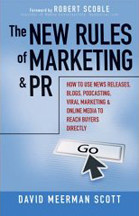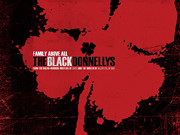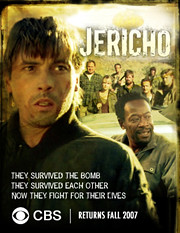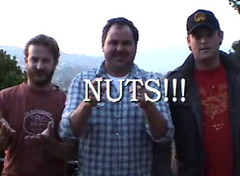As much credit as I have given to deserving Jericho fans for convincing CBS to reinstate their program, I'm equally inclined to write how they could unintentionally be responsible for destroying any chance for a season three. Right now it seems, the only shadows being cast by their cause are shadows of doubt.
You only have to look at history to find some similarities between the town and its historic namesake to appreciate that if the walls of Jericho are going to fall, it's likely to be from the inside out. Sure, it hasn't happened yet, but the writing is all over the CBS boards. Without a common enemy any longer, fans now fight from within.
It's disappointing, but not surprising. Throughout history, and even today in faraway places like Iraq, humankind has an uncanny ability to put differences aside in order to rise up for a common cause. But then, they are equally inclined, after winning the day, to quickly descend back into tribal rivalries, jealousy, and petty bickering.
Ergo, I like Jericho fans (you've all been good to me), but after reading an "Open Letter to Jericho Fans or CBS and other boards," I think it's time someone reminded them where the focus should be.
If the fans continue to single out people who helped move the protest forward, guess at their motivations, and levy charges against them that smack of character assassination, then all your efforts will be for naught. As I cautioned back on June 10, only focus will ensure continued success and see this show capture a third season.
Worse, what new fans will want to participate on boards ripe with infighting as opposed to the finer points of programming that appear front and center on the CBS message boards? This is precisely why I suggested you move such discussions off those boards.
Alas, the egos (not the eagles) have landed in the fan base and my second case study on Jericho is coming dangerously close to crashing down as fans pit themselves against one another. Why is it happening? History repeats. A lack of organization, not all that dissimilar to several Jericho episodes, demonstrates how internal politics is always the greatest threat for any loosely formed government, organization, company, and, well, fan base.
Never mind the details of the arguments as they are always the same, regardless of the group. Never mind them because none of them does anything to further where the focus should be: in establishing a fan club, promoting the reruns, and creating a friendly environment for new fans who are interested to see if season two is warranted.
No, some would rather argue the finer points of things like whose name might appear on the Guinness application or how much effort needs to be devoted to taking down Nielsen. Ha! Since the fans are not privy to everything we know, please allow me to spell it out.
You don't have to change Nielsen because Nielsen already knows it needs to change. In fact, just yesterday, it already did. The Nielsen Company (formerly VNU) and NetRatings, Inc. completed the previously announced merger of NetRatings with a wholly owned subsidiary of The Nielsen Company.
They know they need to change because advertisers are not as enamored by them as some people have suggested. Just yesterday, one of my clients (whom I won't name), a mid-sized agency in my market, declared they were tossing out all their Nielsen and Arbitron books because the rating system is broken after being sliced too thin in an effort to retrieve more ethically diverse demographics.
"We don't need to look at ratings to pinpoint where our clients' consumers are coming from because we already know what they watch and listen to based on our own independent research," said the agency principal. "So, the only time we need to know the numbers, which are provided by local stations on demand anyway, is a matter of price point negotiations and nothing more."
But never mind, go ahead and beat the dead horse anyway. That makes much more sense than organizing show promotions and being the front line of communication in a viral consumer-based marketing effort that welcomes new fans with enthusiasm. That makes much more sense than flushing out the expanded Jericho Universe since CBS is too slow to do it for you. That makes much more sense than allowing Jericho Monster to host the Nielsen debate because she does a better job at it than the fan boards.
Ho hum. I would have much rather written about solutions today than a potential fan base meltdown, but I'm not the one who distracts the focal point of the story as much as fans do. Some fans seem to have made this the most visible priority, not me. And frankly, if there is any lesson to be learned here, unless Jericho fans reverse course today, than let it be for fans of The Black Donnellys. Whatever TBD fans do, don't do this.
With luck, maybe next week will bring happier news for Jericho fans as the countdown to bringing the show back continues. Today, however, it seems to me that the Jericho fans are on the wrong side of the mountains in the picture that accompanies this post.

You only have to look at history to find some similarities between the town and its historic namesake to appreciate that if the walls of Jericho are going to fall, it's likely to be from the inside out. Sure, it hasn't happened yet, but the writing is all over the CBS boards. Without a common enemy any longer, fans now fight from within.
It's disappointing, but not surprising. Throughout history, and even today in faraway places like Iraq, humankind has an uncanny ability to put differences aside in order to rise up for a common cause. But then, they are equally inclined, after winning the day, to quickly descend back into tribal rivalries, jealousy, and petty bickering.
Ergo, I like Jericho fans (you've all been good to me), but after reading an "Open Letter to Jericho Fans or CBS and other boards," I think it's time someone reminded them where the focus should be.
If the fans continue to single out people who helped move the protest forward, guess at their motivations, and levy charges against them that smack of character assassination, then all your efforts will be for naught. As I cautioned back on June 10, only focus will ensure continued success and see this show capture a third season.
Worse, what new fans will want to participate on boards ripe with infighting as opposed to the finer points of programming that appear front and center on the CBS message boards? This is precisely why I suggested you move such discussions off those boards.
Alas, the egos (not the eagles) have landed in the fan base and my second case study on Jericho is coming dangerously close to crashing down as fans pit themselves against one another. Why is it happening? History repeats. A lack of organization, not all that dissimilar to several Jericho episodes, demonstrates how internal politics is always the greatest threat for any loosely formed government, organization, company, and, well, fan base.
Never mind the details of the arguments as they are always the same, regardless of the group. Never mind them because none of them does anything to further where the focus should be: in establishing a fan club, promoting the reruns, and creating a friendly environment for new fans who are interested to see if season two is warranted.
No, some would rather argue the finer points of things like whose name might appear on the Guinness application or how much effort needs to be devoted to taking down Nielsen. Ha! Since the fans are not privy to everything we know, please allow me to spell it out.
You don't have to change Nielsen because Nielsen already knows it needs to change. In fact, just yesterday, it already did. The Nielsen Company (formerly VNU) and NetRatings, Inc. completed the previously announced merger of NetRatings with a wholly owned subsidiary of The Nielsen Company.
They know they need to change because advertisers are not as enamored by them as some people have suggested. Just yesterday, one of my clients (whom I won't name), a mid-sized agency in my market, declared they were tossing out all their Nielsen and Arbitron books because the rating system is broken after being sliced too thin in an effort to retrieve more ethically diverse demographics.
"We don't need to look at ratings to pinpoint where our clients' consumers are coming from because we already know what they watch and listen to based on our own independent research," said the agency principal. "So, the only time we need to know the numbers, which are provided by local stations on demand anyway, is a matter of price point negotiations and nothing more."
But never mind, go ahead and beat the dead horse anyway. That makes much more sense than organizing show promotions and being the front line of communication in a viral consumer-based marketing effort that welcomes new fans with enthusiasm. That makes much more sense than flushing out the expanded Jericho Universe since CBS is too slow to do it for you. That makes much more sense than allowing Jericho Monster to host the Nielsen debate because she does a better job at it than the fan boards.
Ho hum. I would have much rather written about solutions today than a potential fan base meltdown, but I'm not the one who distracts the focal point of the story as much as fans do. Some fans seem to have made this the most visible priority, not me. And frankly, if there is any lesson to be learned here, unless Jericho fans reverse course today, than let it be for fans of The Black Donnellys. Whatever TBD fans do, don't do this.
With luck, maybe next week will bring happier news for Jericho fans as the countdown to bringing the show back continues. Today, however, it seems to me that the Jericho fans are on the wrong side of the mountains in the picture that accompanies this post.






